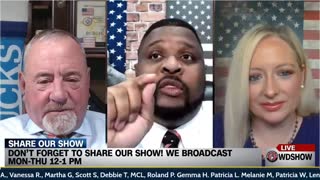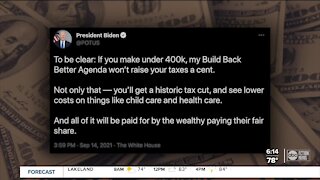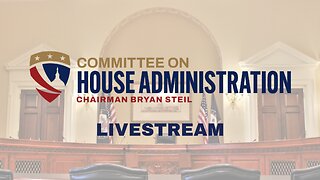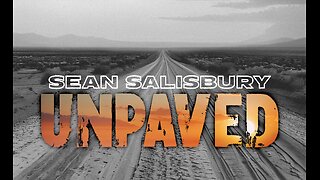Premium Only Content

Should we raise taxes to cut spending?
Should Republicans and Democrats compromise by raising taxes and cutting spending to reduce the deficit?
I used to be more sympathetic to this question.
But now my answer is a firm: No.
For one, it’s difficult to calculate the actual spending-cut-to-tax-hike ratio. In 2011, Obama said he was offering 3-to-1 spending cuts, but the media said it was 2-to-1, some experts believed it was 1-to-1, and the GOP argued it was 1-to-4. It’s hard to reach a compromise when both sides believe they’re getting the short end of the stick.
But for the sake of argument, let’s say Republicans were convinced we’d get 5-to-1 then should we compromise?
Still no.
There’s the electoral factor. Both Eisenhower and H.W. Bush had extremely high approval ratings, but then they raised taxes in exchange for even larger spending cuts, which, therefore, in part caused their party to lose the next election to JFK and Clinton who then cut taxes anyway.
George H.W. Bush regretted breaking his pledge because had he just put the Democrats’ proposed tax increase to the people as Newt Gingrich had suggested then he probably would’ve won reelection.
But I’m not one to advocate for public policies based on what’s politically expedient so let’s consider the third reason why Republicans should say no to an overall tax increase: economic growth. If you increase taxes you’re going to reduce economic growth from what it could’ve otherwise been because you’re likely taking productive capital out of the economy. The government turning around and spending it back into the economy, even if it's on unproductive ventures, at least in the short-term mitigates the growth reduction, but to tax and not spend eliminates the mitigation.
The fourth reason to make people read your lips is that it’s much easier to increase spending than cut taxes. How much has federal spending increased from 1960–2019: 51% in real terms and 4% relative to GDP. There’s a clear upward trajectory in both respects:
How much have taxes gone down? 0%. In fact, they’ve gone up by about the same percentage with the gap being made up via borrowing. This means with a spending-cut-to-tax-hike compromise we’ll likely see the spending cuts reversed, and perhaps more quickly, now that politicians could point to a budgetary surplus as an excuse to splurge a little.
The fifth reason Republicans should say no to a tax increase is that they’ll lose their tax virginity. Once a politician loses their tax virginity it’s much harder for them to resist again in the future. They can try to justify it, but by compromising on what’s most Republicans' #1 priority — tax cuts — it means they’re more likely to compromise again as well as on other matters large and small. If we had legislative term limits or if it was easier to throw out politicians then this might be less of a concern, but the reality is that legislators have around a 90% reelection rate so it’s particularly important that we make Republicans sign the Taxpayer Protection Pledge before we elect them into an effectively lifelong position.
But perhaps the most important reason why Republicans shouldn’t even support a 5-to-1 compromise is the existence of the Fed.
During the 2008 financial crisis, the unelected Fed spent more money than our elected Congress.
The federal government spent $431 billion via TARP and $357 billion via ARRA whereas the Fed spent an estimated $7.7 trillion.
The only real check on the Fed’s spending is inflation where if it rises above 2% then they may try to reduce their spending if they feel it won’t do too much damage to the economy.
They’re American shamans, but without the traditional pizazz.
Inflation can be reduced via raising rates or raising taxes.
Joe Biden’s account tweeted: “You want to bring down inflation? Let’s make sure the wealthiest corporations pay their fair share.”
Some conservatives pushed back on this because it would hurt the economy, but theoretically, his staff correct to draw a connection because what makes money valuable is the labor it represents, therefore, if the Fed wants to print more without the dollar losing too much value then the government must inject it with more blood, sweat, and tears.
So with the existence of the Fed, what might’ve been a 5-to-1 compromise among our elected officials could instigate a downturn that causes our unelected officials to spend so much that government spending effectively turns into 0-to-1 or even -5-to-1.
Read FULL at https://www.anthonygalli.com/
-
 0:40
0:40
KMGH
3 years agoBBB says you should file taxes early
7 -
 2:42
2:42
The Ramsey Show Highlights
2 years agoHow Much Personal Spending Should I Allow For My Wife?
2594 -
 6:03
6:03
The Wayne Dupree Podcast
3 years agoIf Biden's $3.5T Spending Bill Is Paid For, Why Raise Taxes?
3225 -
 2:13
2:13
WFTS
3 years agoShould smokers pay extra in taxes?
91 -
 12:21
12:21
ktrupke
3 years ago268 Should Inflation Give You a Raise?
11 -
 2:28:12
2:28:12
Committee on House Administration
3 hours agoSubcommittee on Elections Hearing: “Revisiting the 2024 Election with Secretaries of State”
12K2 -
 1:01:58
1:01:58
The Football Terrace
4 hours ago $1.01 earnedGoldbridge SLAMS Neville's AGENDA! Carragher’s Arsenal AGENDA EXPOSED! Arsenal Ready for Madrid WAR
19.9K1 -
 1:24:27
1:24:27
Russell Brand
5 hours agoTrump THREATENS China As Xi Vows to ‘FIGHT TO THE END’ Against US Tariffs – SF562
155K33 -
 1:14:14
1:14:14
Sean Unpaved
5 hours agoGators' Road To Glory! Masters Tournament Preview with PGA Tournament Winner Mark Lye
33.4K2 -
 1:03:13
1:03:13
Timcast
5 hours agoLeftist ASSASSINATION Culture TAKING OVER, 55% Of Left Call For END Of Trump And Elon
221K200